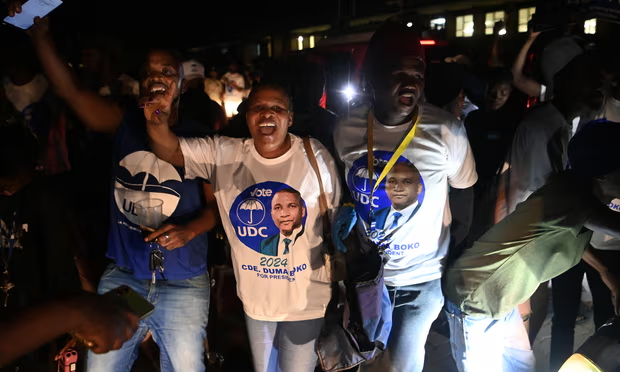Botswana’s president, Mokgweetsi Masisi, has conceded defeat in Wednesday’s elections, which his Botswana Democratic party lost by a landslide after nearly six decades in power.
With almost all constituencies counted, the opposition coalition Umbrella for Democratic Change (UDC) had secured a parliamentary majority, with its leader, the lawyer Duma Boko, on track to become the southern African country’s next president.
Soaring unemployment has hit young people especially hard, fuelling a backlash at the ballot box against the BDP, which has ruled the country of 2.5 million people since it became independent from Britain in 1966. The election result is also part of a wider wave of popular discontent that has swelled across the continent, amid a lack of good jobs for growing youthful populations.
“Although I wanted to stay on as your president, I respect the will of the people and I congratulate the president-elect. I will step aside and I will support the new administration,” Masisi said at a press conference on Friday morning, when only part of the results had been released.
State television later showed that out of 55 of the 61 constituencies that had reported results, the UDC had won 32 seats, while the BDP was in last place out of four parties with just four seats. MPs will now elect the president.
Boko, who had pledged to raise the minimum wage and increase social grants, told the local news outlet Mmegi: “It shocked me, the numbers … I’m humbled.”
Botswana is the world’s second-largest diamond producer,. Income from the gems is credited with helping the country to be one of the region’s most stable and wealthy states.
Nevertheless, a global slump in demand for diamonds has led to a sharp economic contraction: the IMF predicts economic growth of 1% this year, down from 2.7% in 2023 and 5.5% in 2022. Unemployment has risen to 28%, while more than a third of 15- to 35-year-olds are out of work.
“The result was unexpected,” said Zoë McCathie, an analyst at Signal Risk. “Economic conditions in the country at the moment, specifically unemployment levels, have been a big factor.”
The capital, Gaborone, was calm on Friday morning, with small groups of opposition supporters celebrating in the streets. “I did not ever think I would witness this change in my life,” said Mpho Mogorosi, a 23-year-old student. “The BDP had stayed too long in power and I am proud to be part of the people that removed them for a better Botswana.”
The BDP was the second long-ruling party in southern Africa to experience defeat at the polls this year, after South Africa’s African National Congress also lost its parliamentary majority after 30 years in power and was forced to form a coalition government.
Neighbouring Namibia will hold elections later this month, with the Swapo party, which has ruled since 1990, expected to face a strong challenge. Mozambique’s ruling Frelimo party was declared the winner of elections in October amid allegations that the results were rigged and killings of opposition figures.
Source: The Guardian and Reuters

